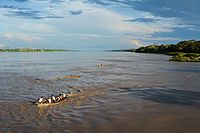
Photo from wikipedia
Streamflow data is highly relevant for a variety of socio-economic as well as ecological analyses or applications, but a high-resolution global streamflow dataset is yet lacking. We created FLO1K, a… Click to show full abstract
Streamflow data is highly relevant for a variety of socio-economic as well as ecological analyses or applications, but a high-resolution global streamflow dataset is yet lacking. We created FLO1K, a consistent streamflow dataset at a resolution of 30 arc seconds (~1 km) and global coverage. FLO1K comprises mean, maximum and minimum annual flow for each year in the period 1960–2015, provided as spatially continuous gridded layers. We mapped streamflow by means of artificial neural networks (ANNs) regression. An ensemble of ANNs were fitted on monthly streamflow observations from 6600 monitoring stations worldwide, i.e., minimum and maximum annual flows represent the lowest and highest mean monthly flows for a given year. As covariates we used the upstream-catchment physiography (area, surface slope, elevation) and year-specific climatic variables (precipitation, temperature, potential evapotranspiration, aridity index and seasonality indices). Confronting the maps with independent data indicated good agreement (R2 values up to 91%). FLO1K delivers essential data for freshwater ecology and water resources analyses at a global scale and yet high spatial resolution.
Journal Title: Scientific Data
Year Published: 2018
Link to full text (if available)
Share on Social Media: Sign Up to like & get
recommendations!